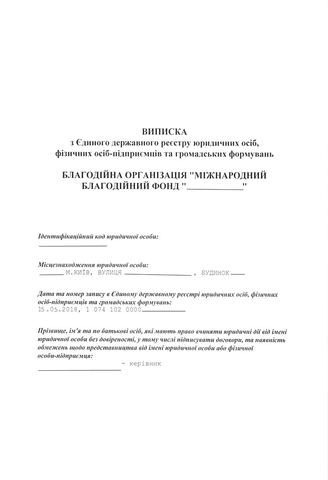Donation of real estate by LLC to nonprofit organization: taxes and risks
Cost of services:
Reviews of our Clients
Today, businesses are increasingly engaging in charitable activities, supporting social projects through public organizations and foundations. However, beyond social responsibility, such transactions carry significant tax and financial implications that must be considered at the planning stage.
In this article, we’ll explore the tax (and financial) consequences of making a charitable donation as a limited liability company (LLC), the most common legal form for businesses in Ukraine. In particular, we’ll look at corporate income tax, value-added tax (VAT), and other potential payments related to charitable donations. But first, let’s learn how an LLC should properly formalize a donation of real estate to minimize risk.
You might also like: Why Is Oversight of Ukrainian Non-Profit Organizations Necessary?
Donation Agreement as a Tool for Controlled Asset Transfer
Is your company looking to donate premises or other real estate to a non-profit organization? In such cases, a donation agreement becomes an effective legal tool that combines a specific purpose with the ability to maintain control over the outcome.
A donation is not merely a gift; it’s the transfer of ownership rights to property or assets on a gratuitous basis for defined purposes. Most often, this purpose is related to public, charitable, or social activities. This allows donors to demonstrate social responsibility while gaining reputational and tax advantages.
The key difference between a donation agreement and a standard gift lies in the defined purpose of the donated property. This purpose gives the donor the right to monitor how the donated resources are used in line with the agreed objective. If the terms of the agreement are violated, specifically, if the donation is used for unintended purposes, the donor has full legal grounds to demand termination of the agreement.
Thus, a donation agreement is not only a legal mechanism for transferring assets but also a powerful tool for targeted impact, ensuring oversight of the effectiveness of charitable or public initiatives. This, in turn, is crucial for minimizing risks, including tax-related ones.
Corporate Income Taxation of Real Estate Donations
The Tax Code of Ukraine (TCU) defines the free provision of goods, works, or services as those given under a gift agreement or similar arrangement where no monetary or other compensation is provided, nor is a return of the goods expected, and may even occur without formal agreements.
For tax purposes, the free transfer of real estate is treated as a sale, as it involves the transfer of ownership rights. It is important to note that the TCU does not contain separate provisions for the taxation of real estate transferred on a gratuitous basis. Accordingly, the organization must recognize income and determine the cost of such disposal in accordance with accounting standards.
You might also like: How to Respond to Tax Authorities’ Requests for Information
How to Determine Income from a Real Estate Donation
A donation agreement does not provide for payment or any form of compensation for the transferred property, which means both the contractual value and the income from the transaction are considered zero. Expenses, in this context, refer to the property's value (initial or residual), any improvements (modernization), and accumulated depreciation (amortization).
Any transfer of property ownership, including under a donation agreement, requires the asset to be written off the company’s balance sheet. In such cases, the residual value of the real estate is recorded as an expense for the company.
When donating real estate, tax differences arise on the expense side. If the donation is made to a non-profit organization listed in the Registry of Non-Profit Institutions and Organizations, the associated expenses can only be recognized within the limit of 4% of the taxable profit from the previous reporting year.
If the residual value of the property exceeds this threshold, the company must increase its pre-tax financial result by the amount of the excess, except in cases where the company reports a loss for the current year. Accordingly, if the company is operating at a loss, the financial result must be increased by the full residual value of the real estate asset.
Let’s break this down with an example:
Initial value of the real estate asset: UAH 10,000,000
Useful life: 10 years (120 months)
Time in use: 5 years (60 months).
Taxable profit from the previous year: UAH 5,000,000
1. Calculate accumulated depreciation over 5 years: UAH 10,000,000 / 120*60 = UAH 5,000,000
2. Calculate residual value: UAH 10,000,000 – UAH 5,000,000 = UAH 5,000,000
When a real estate asset is donated, the company recognizes UAH 5,000,000 in expenses and reflects this amount in its financial results (Statement of Financial Performance).
3. Tax differences. Determine the 4% limit for recognizing donation-related expenses: UAH 5,000,000 *4% = UAH 200,000
4. Calculate the adjustment to the financial result: UAH 5,000,000 – UAH 200,000 = UAH 4,800,000.
The company must increase its financial result by UAH 4,800,000, and pay 18% corporate income tax on that amount.
VAT Taxation of Real Estate Donation Transactions
It is important to note that any gratuitous transfer (disposal/donation) of real estate qualifies as a supply, meaning such a transaction is subject to VAT. Therefore, in the case of a donation, VAT liabilities must be accrued. To fulfill this obligation, two tax invoices must be issued:
- The first tax invoice is for the amount calculated based on the supply price (as noted earlier, this amount will be zero);
- The second tax invoice is for the amount calculated based on the excess of the book (residual) value over the actual sale price. In our case, this will be equal to the residual value of the real estate.
Please note! Both tax invoices must be registered in the Unified Register of Tax Invoices.
You might also like: Obtaining a Permit for the Import of Military or Dual-Use Goods: A Success Story
Risks of Donation Transactions to a Non-Profit Organization
The tax authorities typically scrutinize all transactions involving the free transfer of property, especially real estate, for signs of fictitious arrangements. This poses a risk to both parties in the donation agreement. If the tax authority deems the transaction fictitious:
- The donor’s income will be determined under the general rules applicable to a sale agreement;
- The receipt of the donation by the non-profit organization will be treated as income used for non-charitable purposes, which could result in the loss of its non-profit status and the obligation to register as a VAT payer.
To avoid such situations, both parties to the agreement must have substantiated evidence of the transaction and proper documentation. Such documents may include:
- A description of the non-profit organization's activities and its charter, clearly demonstrating the need for the donated real estate;
- A track record of the organization’s operations and its partnerships with other entities;
- Publicly accessible information about the organization’s work (e.g., social media, website, online presence);
- Documentary proof of the property’s value;
- Monthly photo/video documentation confirming the property is being used for its intended purpose.
Helping Companies Donate Without Tax Risks
Your donations are not just acts of goodwill or investments in change. They are also serious tax and legal transactions that carry a high level of responsibility. Without the right approach, they pose a risk of additional tax assessments, penalties, or even the loss of non-profit status for the recipient.
We are results-driven and help businesses act transparently, safely, and with fully anticipated outcomes. Our legal team will:
- Analyze your specific situation and provide tailored advice, including on applicable tax benefits;
- Support the entire donation process, from drafting the agreement to preparing the necessary reports;
- Help optimize taxation using legal mechanisms.
Planning to donate real estate? Contact us and we’ll help you do it efficiently, ensuring full legal compliance and complete confidentiality.
Our clients

















